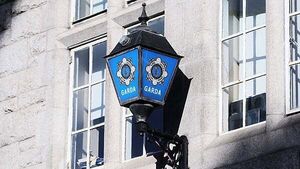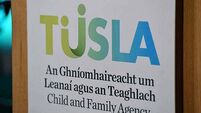'Worrying pattern of far-right violence' in targeted attacks on foreign nationals

James Cox
Targeted assaults on foreign nationals in Dublin and Limerick are examples of a "worrying pattern of far-right violence", according to an Irish anti-racism group.
In July, an Indian man on his way to work in Dublin was set upon and beaten, stripped and stabbed by a large group of men. Jennifer Murray, a local woman, stepped in to help him.
Also in July, a 64-year-old man originally from Afghanistan and seeking safety in Ireland was assaulted in broad daylight in Limerick city. He received several injuries, including a broken nose.
Both incidents were driven by misinformation on social media, with far-right agitators claiming the innocent men had committed sexual offences against children.
In an interview with BreakingNews.ie, Emily Duffy, of the Hope and Courage Collective (H&CC), said: "What we're seeing is a pattern of violence towards people from ethnic minority backgrounds, people the far-right perceive as different or outside of the container of what it means to be Irish.
"These tactics aren't anything new, they have been learned from European fascists, they have been learned from the types of lynchings that happened in the past in the deep American south by the KKK.
"It is essentially to create a narrative around children and women. What is different now is that social media, the way the algorithms are designed is to reward outrageous content; content that literally engenders fear, disgust and anger. These are the three emotions that make people spend longer on platforms.
"When people create this type of content, which is nothing new, an old racist tactic, what we have now is an engine that makes it fly through the algorithm, particularly in a local setting."
Pointing to the incident in Limerick, Ms Duffy said the misinformation circulated on local algorithms.
'Copycat tactics'
"We see this over and over with all of these racist assaults occurring at the moment. There is a very strong social media element to it and there are copycat tactis they are learning from each other and past white supremacist and racist tactics."
In the days prior to the Limerick attack, the victim was harassed in a local park. Individuals filmed him and posted footage to social media. A false allegation began on the afternoon of Sunday, June 29th, when a woman uploaded a photo of the man alongside a fabricated story. This post was rapidly shared, including by members of Sinne Na Daoine (SND), inflaming local tensions and resulting in the assault two days later.
SND is a group that states they are a community watchdog “dedicated to the safety and solidarity of Irish communities“.
The group was set up in September 2023 by Anthony Casey, a former Irish Freedom Party candidate and the most recent and now former president of Ireland First. Initially SND operated online, sharing local crime alerts but has since moved offline. In 2025 the group and Casey came under media and public criticism for potentially encouraging vigilante activity.

According to a H&CC report: "Behind their self styled 'community watch' branding is an ideological agenda. Since their inception, SND have been involved predominantly in protests opposing the accommodation of people seeking asylum in Ireland, as well as spreading false information designed to incite strong emotion, such as claiming the monks living in of Mount Melleray Abbey in Waterford were to be evicted to make way for international protection applicants – a complete falsehood designed to provoke nativist emotion in persuadable audiences. This activity is also used as a recruitment tool."
After the assault, the victim’s image with a bloodied nose and the location where he was assaulted was shared numerous times across multiple platforms as his face became known.

Ms Duffy said there is a "real risk" that escalating racial violence could have lethal consqeuences.
She said this has happened before in Ireland, pointing to the murder of Josip Štrok in Dublin in 2024, a man who was killed by two teenagers because they heard him speaking Croatian.
Ms Duffy called on Minister for Justice Jim O'Callaghan, and Ireland's EU Commissioner Michael McGrath, to take action on social media recommender systems.
These algorithms often create echo chambers for violent and racist content, and the Hope and Courage Collective has long called for them to be banned.
"We need our Minister for Justice, An Garda Síochána, to take this seriously. We need our Minister to show brave political leadership around this, and we also need the EU Commissioner Michael McGrath to take this seriously. He has the power under the new democracy shield that is being developed to turn off the recommender system, the toxic algorithm, this river of hate that is normalising this violence.
"Online hate results in real world violence, and potentially loss of life... murder. We're very worried about that."
She was also critical of Mr O'Callaghan's recent focus on deportations.
"The Minister needs to understand his words carry weight, and if he is pushing this tough on immigraiton stance, pandering to this far-right narrative, it will embolden them.
"Sometimes politicans pander to extreme voices thinking it will make them be quiet, but actually it just makes them louder. Instead what we need them to see is the courage in communities, the welcome in our communities, the fact people have become knitted into the fabric of our society, and we can't just rip them out and deport people to appear tough.
"We're asking for the Minister to show that leadership, and for the recommender system and these toxic algorithms to be turned off.
"You cannot appease hatred, it is not rational. These minorities are very organised online and their narrative is pushed and supported by the algorithm."
Ms Duffy said the community response against racism is a reason to be positive, pointing to an anti-racism demonstration that occurred in Tallaght following the assault.
We are worried that if serious action is not taken we will see more and more violence.
"On the flipside, what we're also seeing is communities are really rallying and people are really angry over this type of violence, people say 'not in my name'. We saw in Tallaght after that Indian man was assaulted there was a huge rally.
"What we're seeing is although this is a small minority, potentially becoming more violent because they are not managing to get elected, not managing to convince the wider public of their racist beliefs, what they're doing instead is beoming more extreme and violent, and trying to create this atmosphere of fear and suspicion. When they create that atmosphere they think it is a way to grow and get more power, essentially holding communities hostage in a lot of areas and creating this scary atmosphere for communities.
"What we've seen is communities showing up with an incredible amount of courage. We saw in Limerick, Doras were able to support that man. People in Limerick have come out and said they are disgusted by this behaviour and it is not the Ireland they want."
She added: "The flipside is while this is rising we are seeing huge amounts of community leadership. Now what we need to see is our actual leadership, our political leadership matching the courage of communities.
"The Minister's rhetoric around ramping up deporations, getting tough, all this is doing is emboldening a really extreme minority. Most people are welcoming, compassionate, they want to get to know their new neighbours, create community.
"We are worried that if serious action is not taken we will see more and more violence.
"There is a pattern of racist violence, there is a particular thing going on which is not coming from nowhere. We can see clear sources for these narratives and rhetoric, what puts racialised people at risk.
"Each individual case needs to be taken seriously along with the pattern behind them."




